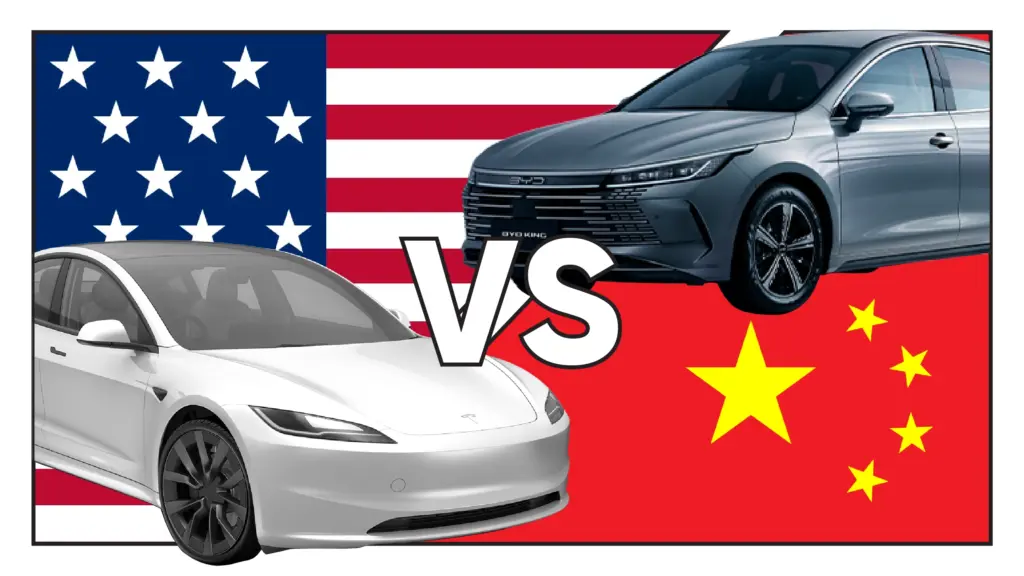
Chinese electric vehicles (EVs) are finally making waves in the U.S. market, and they’re bringing more than just competitive prices. With automakers like BYD, SAIC, and Geely leading the charge, there’s growing interest—and concern—over how these brands will perform in a market dominated by Tesla, GM, and Ford.
However, entering the U.S. market isn’t just about building high-quality cars; it involves navigating a maze of tariffs, regulatory requirements, and public skepticism. Let’s explore what’s driving this EV revolution, the roadblocks Chinese automakers face, and the impact on car buyers, including one overlooked aspect: diminished value.
Tariffs and U.S. Content Requirements
While Chinese EV brands may seem poised to take over with their affordable models, there’s one significant hurdle: tariffs. To avoid steep import taxes, Chinese automakers will need to manufacture vehicles in the U.S. or source a high percentage of parts locally.
For instance, U.S. regulations might require that critical components, like lithium-ion batteries, be domestically produced. This shift would raise production costs but create more American jobs, aligning with federal incentives for local manufacturing. Automakers like BYD have already started laying the groundwork by exploring partnerships with U.S.-based suppliers.
The result? More affordable EV options with “Made in America” credibility—if they can overcome the challenges of building factories, logistics, and supply chains in unfamiliar territory.

How about letting our team get you the best value for your insurance claim?
- Discover your car’s true value
- No payment upfront
- Vehicle history report
What About National Security Concerns?
Chinese EVs often come equipped with advanced connectivity features, from over-the-air software updates to onboard cameras. While these technologies appeal to tech-savvy buyers, they raise concerns about privacy and national security.
For example, U.S. regulators may require connected Chinese vehicles to store data in local servers to prevent potential misuse. Alternatively, automakers could strip down features on export models to avoid data privacy conflicts altogether. Both strategies could impact the vehicles’ competitiveness in a highly tech-driven market.
The average diminished value amount is $6,200. We can help you get what you deserve.
How Tariffs Could Affect Pricing
One of the biggest selling points of Chinese EVs is their affordability. Models like the BYD Dolphin start at under $20,000 in China, significantly cheaper than many U.S. options. However, if tariffs remain in place, that affordability might evaporate.
Even without tariffs, adapting Chinese vehicles to meet U.S. safety and emissions standards will add costs. Buyers may still find these cars cheaper than traditional brands, but they won’t be the game-changer in pricing many are expecting.
For example, in Europe, the BYD Dolphin sells for around $24,000, compared to $19,000 in China—a direct result of regulatory compliance and logistical costs. A similar trend is expected in the U.S. market.
GET MORE MONEY FROM THE INSURER
Don’t leave money on the table! Order a FREE Claim Review and discover your car’s true value.
Diminished Value Expectations for Chinese EVs
One area that consumers need to keep an eye on is how Chinese EVs will hold their value over time. Resale value is a critical factor for buyers, especially when purchasing from newer or foreign brands. Let’s break down what could impact the diminished value of Chinese EVs:
1. Market Trust and Brand Perception
Consumers in the U.S. are more familiar with brands like Tesla or Ford, and trust plays a huge role in resale value. Chinese automakers may face a stigma, particularly in their early years, leading to faster depreciation rates compared to established brands.
2. Service and Repair Accessibility
One of the biggest contributors to diminished value is the availability of parts and service networks. If Chinese EVs lack a widespread dealership or repair infrastructure, potential buyers may shy away from used models, lowering their resale value.
3. Technological Obsolescence
Advanced features, such as autonomous driving and connectivity, could become outdated faster than the competition, especially if updates or parts are unavailable. This could further erode their market value.
4. Insurance and Warranty Concerns
Insurance companies may hesitate to provide competitive rates for brands with limited market presence, leading to higher costs for owners. Similarly, warranty concerns might reduce buyer confidence in used Chinese EVs, further decreasing resale value.
In this context, buyers should weigh the potential savings of a new Chinese EV against the likelihood of higher depreciation. Consulting an appraiser to evaluate the diminished value before buying or trading in such vehicles will be a critical step.
Not sure if the insurance offer is fair? Get a Free Claim review from our experts!

Final Thoughts
Chinese EVs are bringing new competition to the U.S. market with their affordable pricing and innovative features. However, challenges like tariffs, regulatory compliance, and consumer trust loom large.
For car buyers, the appeal of a lower sticker price might come with hidden costs, including faster depreciation and limited support networks. Whether these brands can overcome these hurdles remains to be seen, but one thing is certain: their arrival will shake up the market and provide buyers with more options.
If you’re considering purchasing a Chinese EV, keep resale value and support infrastructure in mind. As always, staying informed is your best tool for making the right decision.



